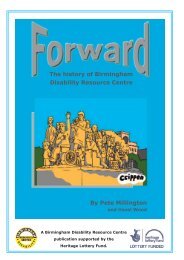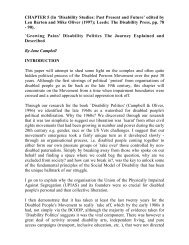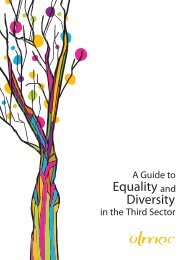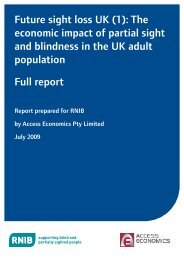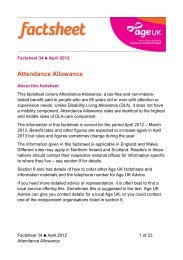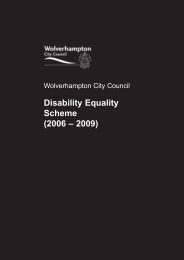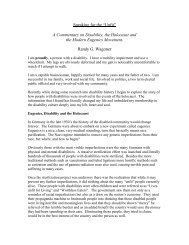What equality law means - Birmingham Disability Resource Centre
What equality law means - Birmingham Disability Resource Centre
What equality law means - Birmingham Disability Resource Centre
Create successful ePaper yourself
Turn your PDF publications into a flip-book with our unique Google optimized e-Paper software.
questions procedure<br />
race<br />
rated as equivalent<br />
reasonable adjustment<br />
regulations<br />
religion or belief<br />
religion or belief<br />
organisations<br />
religious organisation<br />
retirement age<br />
A discrimination <strong>law</strong> procedure whereby written preaction<br />
questions are issued to the respondent, i.e. the<br />
person or organisation against whom a discrimination<br />
claim may be made. The questions are usually put onto<br />
a standard written form which is often called a<br />
‘questionnaire’.<br />
Refers to the protected characteristic of race. It refers<br />
to a group of people defined by their colour, nationality<br />
(including citizenship), ethnic or national origins.<br />
An equal pay concept – see equal work.<br />
See the duty to make reasonable adjustments.<br />
Secondary legislation made under an Act of Parliament<br />
(or European legislation) setting out subsidiary matters<br />
which assist in the Act's implementation.<br />
Religion has the meaning usually given to it but belief<br />
includes religious and philosophical beliefs including<br />
lack of belief (e.g. atheism). Generally, a belief should<br />
affect your life choices or the way you live for it to be<br />
included in the definition.<br />
An organisation founded on an ethos based on a<br />
religion or belief. Faith schools are one example of<br />
a religion or belief organisation. See also religion<br />
or belief.<br />
See religion or belief organisations.<br />
The age at which an employee retires or is expected to<br />
retire. This may be the default retirement age of 65<br />
(until abolished on 1 October 2011), or an age which is<br />
set in the employee’s contract of employment or the<br />
normal retirement age in that employment. The<br />
employer may also impose a retirement age on workers<br />
who are not employees, but this must be objectively<br />
justified even if it is 65 or above.<br />
right to request flexible working Employees with at least 26 weeks’ service have the<br />
right to request flexible working under a formal<br />
procedure in order to care for children or certain adult<br />
relatives. This is simply an entitlement to go through a<br />
formal procedure to have the request considered in a<br />
100




